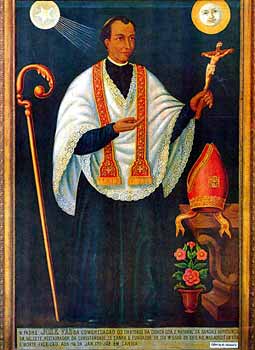 Joseph Vaz was born in Goa, India, in 1651. As a priest he volunteered to work in Sri Lanka amid persecution of Catholics by Dutch colonial rulers, who were Calvinists. Catholic priests were forbidden to preach; it would mean imprisonment and even death if they were caught.
Joseph Vaz was born in Goa, India, in 1651. As a priest he volunteered to work in Sri Lanka amid persecution of Catholics by Dutch colonial rulers, who were Calvinists. Catholic priests were forbidden to preach; it would mean imprisonment and even death if they were caught.
He went to Ceylon disguised as a labourer. He walked the rural paths through the tea-gardens, searching for Catholics, ministering to their needs, instructing them in the faith, regularising their marriages, baptising their children, and celebrating Holy Mass in their homes and villages. He was a veritable apostle for the Sri Lankan Church and he renewed the faith which had been affected by persecution. He also instrumental in converting a number of people to Christianity.
It was in 1693 that Vaz worked a miracle of rain during a drought and the King of Kandy offered him protection and freedom to preach the Gospel in the Kingdom of Kandy. He used the missionary method of inculturation and composed a para-liturgy in Tamil and Singhala. He educated his servant John to be a priest. John belonged to the Kumbi tribe which at that time was not accepted for priesthood. During a small epidemic in Kandy, the king and other nobles fled but Vaz remained ministering to the dying and abandoned victims for almost two years. He died in 1711 after 23 years of arduous missionary work in Sri Lanka.
Joseph Vaz has the distinction of founding a missionary Oratory – priests who would be available for frontier missionary work.
He was beatified by John Paul II on 15 January 1995 and canonised by Pope Francis on 14 Jan 2015.
